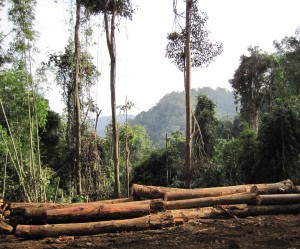
Logging in a tropical forest. Photo courtesy of Ben Ramage
What is the role of logging in tropical forests? How is biodiversity affected by this logging? The answers differ and are controversial among ecologists, environmentalists, and policymakers, and these disagreements have implications for the conservation of biodiversity.
A new paper by postdoctoral researcher Benjamin Ramage, assistant professor Matthew Potts, and other members of the Potts Lab, published in Conservation Biology, exposes a critical factor underlying these disagreements, shedding light on past controversies and providing a path forward. The researchers combined a literature review and an analysis of field data to show that (a) most studies of logging in tropical forests suffer from a serious methodological flaw (the failure to distinguish effects of logging from pre-existing differences between logged and unlogged areas), and (b) there is a high probability that pre-existing spatial variation will be falsely interpreted as a treatment effect in such studies.
The results of the study demonstrate that logging effects have been systematically exaggerated while important differences relating to specific management strategies have been obscured. These findings have major implications for the science behind tropical biodiversity conservation, as current policies and initiatives are relying upon a body of peer-reviewed literature that is rife with unwarranted conclusions. Confronting these issues is essential for accurately assessing biodiversity in logged forests, identifying the relative merits of specific management practices and landscape configurations, and effectively balancing conservation with timber production in tropical forests.
The researchers suggest solutions to these problems to provide an immediate positive feedback on the interpretation of past studies and the implementation of future initiatives. In addition, by demonstrating that methodological issues can permeate and undermine an entire sub-discipline, jeopardizing the success of numerous related initiatives, this paper presents a cautionary tale that may catalyze similar critiques in other areas of ecology.
Read the online version of the published paper
Ohio Fake ID - Seamlessly Enter Venues, Rent Cars, and Book Hotels with Confidence!
